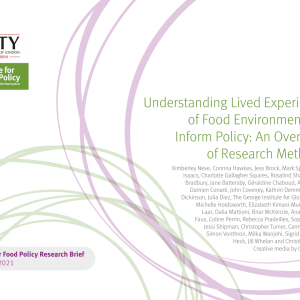
This report by the Centre for Food Policy at City, University of London summarises the qualitative research methods that are available to help understand how people interact with food environments, including interviews, community observation and photo elicitation. The report notes that there has been relatively little qualitative (compared to quantitative) research on lived experiences of food environments, and that existing qualitative research often guides commercial product development but is less often used to inform policy.
The report identifies three classes of relevant research methods:
- Group I: Exploring experiences, perceptions, beliefs and practices, and social networks. Appropriate methods include various forms of interview, group discussions, diaries, visual methods such as concept mapping, and geospatial methods such as geotagged photography.
- Group II: Observing practices in situ to identify (often unconscious) habits of daily life, which can then be explored in more detail using Group I methods. Appropriate methods include observing communities, accompanying participants on (say) shopping trips and transect walks.
- Group III: Designing policy and interventions with participants, drawing on their lived experiences. Appropriate methods include photovoice (where participants take photos of their local environment and then use group discussions to discuss the photos and assign them captions), food systems mapping of the local food environment, consensus panels and co-creation (between participants and researchers) of the research process and solutions.
Read the full report, Understanding Lived Experience of Food Environments to Inform Policy: An Overview of Research Methods, here (PDF link). See also the Table explainer What can be done to shift eating patterns in healthier, more sustainable directions?







Post a new comment »